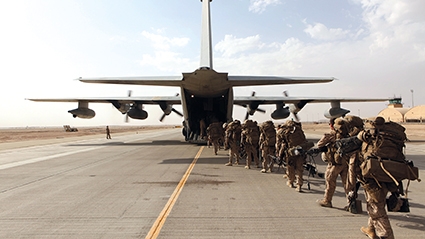The US Withdrawal from Afghanistan: Implications
In December 2018, the Trump Administration announced its military will start withdrawing roughly 7,000 troops from Afghanistan in the coming months. The US decision will mark a major and perhaps abrupt shift in the 17-year-old war the country has waged in Afghanistan.
The US move is interesting and seemingly goes against recent developments inside Afghanistan: there was a spike in violence (terrorist attacks, etc.) across the country, largely a result of the local elections. On a foreign policy level, Russia, Iran and Pakistan, which all now share difficult relations with the US, will likely try to use the US withdrawal to their advantage.
These local and global developments bring about the following questions: how will the withdrawal from Afghanistan affect the Eurasian continent? How will the US policies evolve and how will the vacuum of power be filled by other powers?
The US decision is viewed by many with consternation, as pulling out troops could be regarded as a continuation of a major trend under the Trump Administration – withdrawal from major treaties and global responsibilities the US has had since the end of the Cold War. The decision follows a similar one on Syria, where the US plans to reduce its military presence to a minimum, hence the belief that this is a US global retraction.
There are, however, counter arguments to the scenario of a US global weakening. First, the number of troops to be withdrawn from Afghanistan is about half the number the US has in the country now. Moreover, the US pull-out does not mean that the Afghan troops and security contingents will be left in the air. In fact, the Afghan military has been mostly in charge of the country’s security since 2014, when more than 100,000 NATO troops withdrew. Also, beyond the US forces, there are some 7,500 troops from 38 other NATO members and partners in Afghanistan (Georgian forces included) as well as 25,239 private security contractors deployed.
Still, the US withdrawal could be seriously problematic for Afghanistan. Considering how the decision to withdraw its troops was taken, and, generally, Trump’s skepticism about the Afghan mission, the decision could be seen as a prologue to further major financial and military cuts.
The security in the country will deteriorate if fewer finances are put in. To give one example of how important international aid is to Afghanistan: in recent years, about 50% of the Afghan state budget and 90% of its military and police costs have been covered by international donors. Reductions in such funding will weaken the security situation, perhaps leading to the local warlords becoming emboldened and the regions less and less controlled by the central government.
In fact, signs of this process have already been seen. For example, Taliban control over Afghanistan has increased in recent months, and the government currently controls or influences only 55.5% of the country's districts. This is the lowest it has been in years.
The withdrawal will have global repercussions as the situation in Afghanistan is important for its big neighbors. For instance, Pakistan has long tolerated the use of its territory by the Taliban. After the US withdrawal, Pakistan will likely become more open in its aid to the group and may even try to fill the power vacuum.
Since 2001, Russia and Iran have generally supported the Kabul government. Recently, Moscow used the Taliban as a hedge and, along with Iran and Uzbekistan, provided support for Tajik, Uzbek, and Hazara warlords. This will likely be strengthened as the central government’s grip on power in Kabul weakens.
The countries to watch closely after the US withdrawal are Pakistan, Iran and Russia. Each has its security and military stake in Afghanistan. Since it is unlikely that any of them will be able to fully control Afghanistan’s difficult terrain, these states will probably try to enhance the groups close to borders who prove amenable to cooperation. This diversity of foreign interests can push Afghanistan down the road into political and security disarray.
By Emil Avdaliani
Image source: 2014. US Marine Corps Photo












